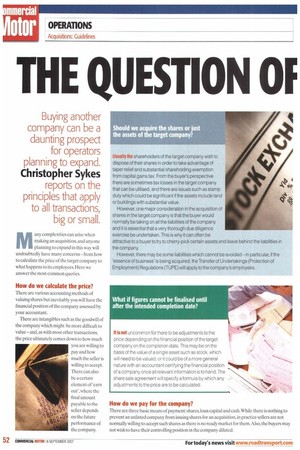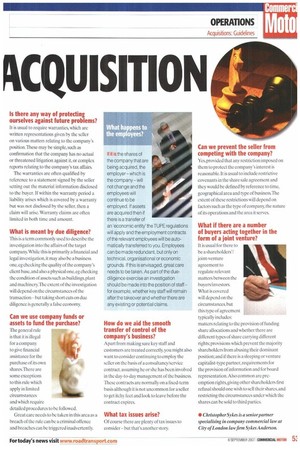THE QUESTION OF RCQUISITION
Page 52

Page 53

If you've noticed an error in this article please click here to report it so we can fix it.
Buying another company can be a daunting prospect for operators planning to expand.
Christopher Sykes reports on the principles that apply to all transactions, big or small.
Many complexities can arise when making an acquisition, and anyone planning to expand in this way will undoubtedly have many concerns — from how to calculate the price of the target company to what happens to its employees Here we answer the most common queries How do we calculate the price? There are various accounting methods of valuing shares but inevitably you will have the financial position of the company assessed by your accountant.
There are intangibles such as the goodwill of the company which might be more difficult to value — and, as with most other transactions, the price ultimately comes down to how much you are willing to pay and how much the seller is willing to accept. There can also be a certain element of 'earn out', where the final amount payable to the seller depends on the future performance of the company.
How do we pay for the company?
There are three basic means of payment: shares, loan capital and cash.While there is nothing to prevent an unlisted company from issuing shares for an acquisition, in practice sellers are not normally willing to accept such shares as there is no ready market for them. Also, the buyers may not wish to have their controlling position in the company diluted. Is there any way of protecting ourselves against future problems? It is usual to require warranties, which are written representations given by the seller on various matters relating to the company's position. These may be simple, such as confirmation that the company has no actual or threatened litigation against it, or complex reports relating to the company's tax affairs The warranties are often qualified by reference to a statement signed by the seller setting out the material information disclosed to the buyer. If within the warranty period a liability arises which is covered by a warranty but was not disclosed by the seller, then a claim will arise. Warranty claims are often limited in both time and amount.
What is meant by due diligence?
This is a term commonly used to describe the investigation into the affairs of the target company. While this is primarily a financial and legal investigation, it may also be a business one, eg checking the quality of the company's client base, and also a physical one, eg checking the condition of assets such as buildings, plant and machinery.The extent of the investigation will depend on the circumstances of the transaction — but taking short cuts on due diligence is generally a false economy.
Can we use company funds or assets to fund the purchase?
The general rule is that it is illegal for a company to give financial assistance for the purchase of its own shares.There are ii some exceptions to this rule which apply in limited circumstances and which require detailed procedures to be followed.
Great care needs to be taken in this area as a breach of the rule can be a criminal offence and breaches can be triggered inadvertently.
How do we aid the smooth transfer of control of the company's business?
Apart from making sure key staff and customers are treated correctly,you might also want to consider continuing to employ the seller on the basis of a consultancy/service contract, assuming he or she has been involved in the day-to-day management of the business. These contracts are normally on a fixed-term basis although it is not uncommon for a seller to get itchy feet and look to leave before the contract expires.
What tax issues arise?
Of course there are plenty of tax issues to consider —but that's another story.
Can we prevent the seller from competing with the company?
Yes, provided that any restriction imposed on them to protect the company's interest is reasonable. It is usual to include restrictive covenants in the share sale agreement and they would be defined by reference to time, geographical area and type of business,The extent of these restrictions will depend on factors such as the type of company, the nature of its operations and the area it serves.
What if there are a number of buyers acting together in the form of a joint venture?
It is usual for there to be a shareholders'/ joint-venture agreement to regulate relevant matters between the buyers/investors. What is covered will depend on the circumstances, but this type of agreement typically includes: matters relating to the provision of funding share allocations and whether there are different types of share carrying different rights; provisions which prevent the majority shareholders from abusing their dominant position; and if there is a sleeping or venture capitalist-type partner, requirements for the provision of information and for board representation.Also common are preemption rights, giving other shareholders first refusal should one wish to sell their shares, and restricting the circumstances under which the shares can be sold to third parties • Christopher Sykes is a senior partner specialising in company commercial law at City o jr London law firm Sykes Anderson.
































































































































































































